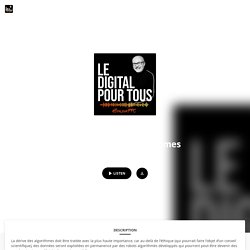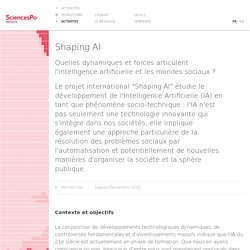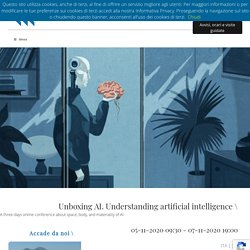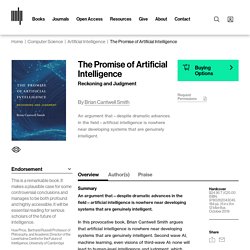

He got Facebook hooked on AI. Now he can't fix its misinformation addiction. Within a year his team had developed these models, as well as the tools for designing and deploying new ones faster.

Before, it had taken Quiñonero’s engineers six to eight weeks to build, train, and test a new model. Now it took only one. News of the success spread quickly. The team that worked on determining which posts individual Facebook users would see on their personal news feeds wanted to apply the same techniques. L'intelligence artificielle et la connaissance utilisateur. La dérive des algorithmes. Description La dérive des algorithmes doit être traitée avec la plus haute importance, car au-delà de l’éthique (qui pourrait faire l’objet d’un conseil scientifique), des données seront exploitées en permanence par des robots algorithmés développés qui pourront peut-être devenir des représentants non désirés dans notre quotidien.

C’est donc à chacun d’entre nous de localiser ses moindres doutes sur tel ou tel programme ou application ou système. Ensuite et seulement avec cet argument, le monde en sortira gagnant. On en parle ici dans cet épisode. Shaping AI. Contexte et objectifs La conjonction de développements technologiques dynamiques, de controverses fondamentales et d'investissements massifs indique que l'IA du 21e siècle est actuellement en phase de formation.

Que nous en ayons conscience ou non, beaucoup d'entre nous sont maintenant impliqués dans la négociation de ce à quoi ressemblera notre avenir avec l'IA - ce que l'IA est, ce qu’elle n'est pas et ce qu’elle peut devenir. SHAPING AI étudie ce processus de formation en cartographiant, analysant et comparant les trajectoires globales et les écologies locales dans quatre pays différents - le Canada, la France, le Royaume-Uni et l'Allemagne - et dans trois domaines différents : les médias, les politiques publiques et la recherche scientifique. Méthodologie. Unboxing AI. Understanding artificial intelligence - Fondazione Giangiacomo Feltrinelli. Stagione Alternativa 2019/2020Research Observatory: Jobless Society Platform In association withINDL European Network on Digital Labour NEXA Center for Internet & Society ISRF Independent Social Research Foundation.

Unboxing artificial intelligence: 10 steps to protect human rights - View. “Ensuring that human rights are strengthened and not undermined by artificial intelligence is one of the key factors that will define the world we live in”, says Council of Europe Commissioner for Human Rights, Dunja Mijatović, in a Recommendation published today.

This Recommendation – entitled “Unboxing artificial intelligence: 10 steps to protect human rights” – provides a number of steps which national authorities can take to maximise the potential of artificial intelligence systems and prevent or mitigate the negative impact they may have on people’s lives and rights. It focuses on 10 key areas of action: human rights impact assessment; public consultations; human rights standards in the private sector; information and transparency; independent oversight; non-discrimination and equality; data protection and privacy; freedom of expression, freedom of assembly and association, and the right to work; access to remedies; and the promotion of artificial intelligence literacy.
COMUИ – COMMENTAIRES ИUMERIQUES ET ORGANISATIONS. Screening & Director Q&A · iHuman — Disruption Network Lab. At BUFA-Studios, Oberlandstraße 26-35, 12099 Berlin Pre-event to the DATA CITIES: Smart Technologies, Tracking & Human Rights conference Seats reservation (limited seats): pretix.eu/disruptionlab/ihuman/ In cooperation with the Human Rights Film Festival Berlin we present the German premiere of the film iHuman by Norwegian director Tonje Hessen Schei. iHUMAN (NO, 2019, 1h 35m, with English subtitles).

Bernard Stiegler, l’un des grands penseurs de notre temps, est décédé. Le philosophe français Bernard Stiegler est décédé le jeudi 6 août dernier.

Il était un philosophe engagé, critique du système capitaliste. Newsletter Musiq3 Restez informés chaque vendredi des évènements, concours et CD de la semaine. OKNe plus afficher × L'impact des nouvelles technologies sur notre société. Sans titre. AI, future of media and CA.2020.key. AI Aesthetics. Save Lev Manovich.

The Promise of Artificial Intelligence. This is a remarkable book.

It makes a plausible case for some controversial conclusions and manages to be both profound and highly accessible. It will be essential reading for serious scholars of the future of intelligence.Huw PriceBertrand Russell Professor of Philosophy, and Academic Director of the Leverhulme Centre for the Future of Intelligence, University of Cambridge This deeply informed book offers a bilateral view of artificial intelligence from computer science and philosophical perspectives, working from good old-fashioned (first-wave) AI through (second-wave) deep learning to the imminent (third-wave) future.
Siri, Alexa, Google Home : petite histoire de l'oralité machinique. Artificial intelligence and its limits - An understanding of AI’s limitations is starting to sink in. IT WILL BE as if the world had created a second China, made not of billions of people and millions of factories, but of algorithms and humming computers.

PwC, a professional-services firm, predicts that artificial intelligence (AI) will add $16trn to the global economy by 2030. Études critiques sur l'intelligence artificielle – L'intelligence artificielle et ses conséquences vues par les sciences humaines et sociales. "Les automates ont toujours triché; et ils continuent de le faire." La métaphysique de l'agentivité des robots du XVIIIe et XIXe siècles nous apporte un éclairage nouveau sur les fantasmes contemporains de l'IA et des usines sans travailleurs. #openaccess. Full article: The ghost factories: histories of automata and artificial life.
Historically, automata had always relied on a trick; and they’re still playing it. Imagine a factory. On the shop floor stands a single worker – a young girl. Surrounding her are the hulking frames of weaving looms, four of them, in riotous mechanical action. De l'agglo à l'algo : bienvenue à Waze-City ! Mai-juin 2020 - Revue Relations. Filmez ce que vous voyez au travers d’une fenêtre de chez vous, et racontez un souvenir important. Class’Code IAI. Conception, production et coordination Sophie de Quatrebarbes, S24B L’interactive. Thierry Vieville, Inria. Claude Terosier, Magic Makers. Conseil scientifique Frédéric Alexandre, Neuroscience Computationnelle. Anne Boyer, Systèmes complexes et intelligence artificielle. Serge Abiteboul, Donnée et réseau. Gilles Dowek, informaticien, logicien et philosophe. "Adopt AI, think later" . La méthode Coué au secours de l'intelligence artificielle.[1]
Éric Sadin : l'asservissement par l'Intelligence Artificielle ? [EN DIRECT] Rapport CES 2020. Voici mon quinzième et dernier Rapport du CES de Las Vegas, édition 2020. Il se situe dans la lignée des précédents et consolide une année d’actualité technologique. Et pour cause puisque tout n’est pas annoncé au moment du CES. Ce grand salon permet de prendre une photo instantanée géante de l’industrie des technologies destinées au grand public.
Je préfère analyser le film avec un séquencement bien connu dans l’innovation : de la recherche, de l’ingénierie, des composants électroniques et autres, des infrastructures (de télécommunications, routières, aéroportuaires, …) puis des produits et des solutions. On ne peut pas appréhender convenablement un produit isolé sans s’intéresser à son amont. Kate Crawford : « les biais sont devenus le matériel brut de l’IA » – InternetActu. Kate Crawford (@katecrawford) est la cofondatrice (avec Meredith Whittaker, @mer__edith) de l’AI Now Institute (@AINowInstitute, blog).
Chercheuse à Microsoft Research, professeur à l’université de New York, elle est spécialiste de l’étude des implications sociales des systèmes techniques et notamment des effets du Big Data, des algorithmes et de l’Intelligence artificielle. Invité du jour - Antonio Casilli : "L’intelligence artificielle ne peut rien sans ses millions de tâcherons du clic" An Urgent Look at How Artificial Intelligence Will See the World - Photographs from Trevor Paglen’s exhibition “A Study of Invisible Images”Review by Alexander Strecker.
“My time at Stanford has centered around a development in image-making that I think is more significant than the invention of photography…” Since its advent, the photographic frame has allowed us to see other people’s visions of the world. When we look at the oldest-surviving photograph—Nicéphore Niépce’s almost postcard-sized View from the Window at Le Gras—we are looking at an approximation of how Niépce saw the world from a high window in his home, looking out over his estate. While writing (especially novels) had long been able to put readers in the mind of another person, this new invention offered an unparalleled degree of exactitude. In the intervening years, the wonder of this invention has largely faded, even becoming banal. Imagination et infini : critique de l'imagination artificielle - Yuk Hui.
A list of artificial intelligence tools you can use today — for personal use (1/3) Personal / In-Home Ems — helps you find the perfect place to liveBridge Kitchen — kitchen assistant for turn-by-turn directions in the kitchenUnifyID — verify your identity by the way you walk, type and sit Work Carly — helps you manage phone callsETCH — helps you manage your networks into a searchable databaseFindo — Your smart search assistant across email, files &personal cloudLeap — recommends companies to apply for based on your skillsLomi — identifies sales leadsMosaic — helps you write better resumesNewton — helps you find a dream jobNotion — helps with email overload, organisation and communicationRobby — a better and smarter calendarStella — scans for jobs and helps manage your application processWoo — helps you make smarter decision for your career, anonymously Social. Benjamin H. Bratton. Étude : usage et avenir des assistants vocaux pour les marques.
L'homme et la robotique à travers Real Humans. Stroryboardthat.com - stroryboardthat Resources and Information. Toyota se sert de l’intelligence artificielle pour de la conception-rédaction. Pratique, quand on a plus de 1000 accroches à rédiger pour 100 cibles. Pour promouvoir sa nouvelle Toyota Mirai qui carbure à l’hydrogène, la marque japonaise accompagnée de son agence Saatchi LA ont conçu la campagne « Thousands of Ways to Says Yes ». Sa particularité ? The Pentagon is building a ‘self-aware’ killer robot army fueled by social media — INSURGE intelligence. By Nafeez Ahmed This exclusive is published by INSURGE INTELLIGENCE, a crowd-funded investigative journalism project for the global commons An unclassified 2016 Department of Defense (DoD) document, the Human Systems Roadmap Review, reveals that the US military plans to create artificially intelligent (AI) autonomous weapon systems, which will use predictive social media analytics to make decisions on lethal force with minimal human involvement.
Despite official insistence that humans will retain a “meaningful” degree of control over autonomous weapon systems, this and other Pentagon documents dated from 2015 to 2016 confirm that US military planners are already developing technologies designed to enable swarms of “self-aware” interconnected robots to design and execute kill operations against robot-selected targets. Le mythe de l’IA surhumaine. On ne présente plus Kevin Kelly (@kevin2kelly), qui fut le premier rédacteur en chef de Wired et auteur de nombreux ouvrages sur la technologie. Son dernier livre, The Inevitable : Understanding the 12 Technological Forces That Will Shape Our Future cherche à déterminer les technologies qui nous influenceront le plus au cours des 30 prochaines années. Kelly ne pouvait manquer d’intervenir dans le débat actuel sur l’avenir de l’IA et sur les inquiétudes que cette dernière suscite actuellement, notamment autour du thème de la « superintelligence » et la possibilité que nos créations technologiques dépassent leurs parents humains et précipitent dans le meilleur des cas, une Singularité nous entraînant vers un paradis technologique, ou, dans le pire, notre extinction.
Ce que prouve son long texte dans Backchannel, c’est qu’on peut être enthousiaste de la technologie sans pour autant souscrire aux mythes les plus influents dans les milieux du numérique. Voici, selon lui, ces cinq postulats : Softlove - Eric Sadin. Wired. Every day across the nation, people doing work for Google log in to their computers and start watching YouTube. They look for violence in videos. Vers l’intelligence étendue ? Intervenant dans un débat en ligne du New York Times autour des enjeux de l’IA, Joi Ito (@joi), le directeur du Media Lab du MIT, expliquait que même très bien intentionné, l’usage des technologies peut mal tourner. « La majeure partie de la recherche en IA se concentre sur l’apprentissage profond : des ingénieurs « entraînent » des machines pour augmenter l’intelligence collective de nos gouvernements, de nos marchés et de nos sociétés ». Les artistes numériques face aux nouveaux enjeux de l’intelligence artificielle.
Présentation SoftLove / Interview. #SoftLove introduction. L’avenir de la désinformation. Zaven Paré - LABEX Arts-H2H. Université Paris 8 2 Rue de la Liberté, 93526 Saint-Denis © Labex Arts-H2H | Mentions légales Conférence hybride Lundi 9 janvier 2017 18h30-20h30 CNSAD Salle Jouvet 2 bis rue du Conservatoire 75009 Paris. Amazon. ChatBot le robot. Drame philosophique en quatre questions et cinq actes (pour pour tout le monde) Il y a bien longtemps, au XXe siècle, les humains voyaient les robots comme des esclaves. C’est du reste ce que signifie le terme robota, inventé en 1920 par le Tchèque Karel Čapek dans sa pièce RUR. L’affaire semblait entendue : un jour ou l’autre, les « esclaves » allaient se révolter, prendre le contrôle sur leurs créateurs et les éradiquer.
Sans pitié, puisqu’un robot n’a pas d’émotions. C’est un tout autre scénario que les recherches actuelles en robotique nous appellent à imaginer. Car les robots ne sont plus seulement conçus pour travailler à notre place. Comment raconter des histoires avec les robots conversationnels ? - Nouvelles Narrations. Cet article a été originellement publié sur le site FMC Veille, que je vous recommande grandement pour ses nombreuses publications sur le monde des nouveaux médias. Recevez d’autres articles comme celui-ci dans votre boîte mail en vous abonnant gratuitement à La Lettre des Nouvelles Narrations.
En 2016, la révolution attendue était celle de la réalité virtuelle.